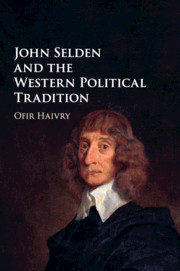Book contents
- John Selden and the Western Political Tradition
- John Selden and the Western Political Tradition
- Copyright page
- Dedication
- Contents
- Preface
- Acknowledgments
- Note on the Text
- Abbreviations
- 1 Introduction: “Glory of the English Nation” – The Life, Works and Ideas of John Selden
- 2 Selden and the Early-Modern Crisis of Knowledge and Obligation
- 3 Selden and the Early-Modern Dispute about the Foundations of Political Order
- 4 Law “Fitted to the Genius of the Nation”: Selden’s Theory of National Tradition in Law and Politics
- 5 Selden and the “Universal Philosophy of Morals” Drawn from the Hebrew Tradition
- 6 A “Single Sword”: Selden’s Theory of Religion and State
- 7 Conclusion: John Selden and the Tradition of Historical Constitutionalism
- Bibliography
- Index
- Miscellaneous Endmatter
- References
Bibliography
Published online by Cambridge University Press: 04 July 2017
- John Selden and the Western Political Tradition
- John Selden and the Western Political Tradition
- Copyright page
- Dedication
- Contents
- Preface
- Acknowledgments
- Note on the Text
- Abbreviations
- 1 Introduction: “Glory of the English Nation” – The Life, Works and Ideas of John Selden
- 2 Selden and the Early-Modern Crisis of Knowledge and Obligation
- 3 Selden and the Early-Modern Dispute about the Foundations of Political Order
- 4 Law “Fitted to the Genius of the Nation”: Selden’s Theory of National Tradition in Law and Politics
- 5 Selden and the “Universal Philosophy of Morals” Drawn from the Hebrew Tradition
- 6 A “Single Sword”: Selden’s Theory of Religion and State
- 7 Conclusion: John Selden and the Tradition of Historical Constitutionalism
- Bibliography
- Index
- Miscellaneous Endmatter
- References
- Type
- Chapter
- Information
- John Selden and the Western Political Tradition , pp. 469 - 484Publisher: Cambridge University PressPrint publication year: 2017

